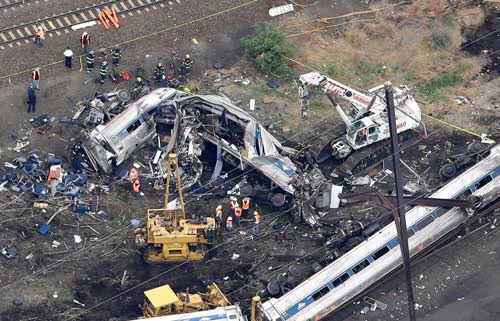
WASHINGTON – By voice vote and with little debate, the GOP-run House whipped through a short-term – three-week – extension of federal highway and mass transit programs and the gas tax that funds them, on Oct. 27. The Senate was expected to agree before authority for the programs and the gas tax expired two days later.
The bill, the latest of dozens of short-term extensions of the highway and mass transit programs, keeps the federal gas tax at 18.4 cents a gallon, a level that hasn’t changed since 1993. It keeps gas tax money flowing to highway and bridge construction, mass transit construction and operations and some other transportation uses, such as bike paths.
Unions supported the short-term extension while again urging Congress to approve a six-year highway-mass transit bill, with a gas tax hike, so there would be adequate money to fund long-term mass transit and highway projects and employ tens of thousands of workers.
Lawmakers predicted that by the new deadline, Nov. 20, they would have crafted such a permanent bill, but they did not say how they would pay for it. Anti-tax, anti-government GOP right-wing radicals have previously stalled and killed past highway-mass transit bills.
“The need for long-term investments in our transportation system and infrastructure will not ‘just go away,'” said AFL-CIO Transportation Trades Department President Edward Wytkind, after TTD leaders met top bipartisan lawmakers on transportation issues on Oct. 26. House and Senate committees are making progress on the long-term legislation, solons said.
Laborers President Terry O’Sullivan thanked lawmakers “for putting aside partisanship to work across party lines to pass a multi-year surface transportation package out of committee.” He said a six-year bill “will make our roads and bridges safer, and create good jobs…We urge Congress to ‘go big’ and build sustainable investment into the program,” so that “a well-funded multi-year highway bill becomes law.”
“We need to increase investments in our infrastructure and focus on the areas that will truly help create jobs and support our economy,” Sen. Bill Nelson, D-Fla., said after the union leaders’ session with the lawmakers. “We also need to protect the men and women who are out there every day making our transportation systems work.”
“Transportation infrastructure is at the heart of the U.S. economy,” added Rep. Peter DeFazio, D-Ore., the House panel’s top Democrat, who favors raising the gas tax. “Our competitiveness, our businesses and millions of American jobs depend on robust investments in our crumbling network of roads, bridges, highways and transit systems. We must… modernize our transportation infrastructure, create good jobs and enhance the rights and working conditions of the men and women who keep America moving.”
The only congressional discussion in the short-term bill was around new legislation, inserted into it, to delay a key rail safety measure, positive train control (PTC) to Dec. 31, 2018.
PTC automatically slows and stops trains that are going too fast, exceeding track speed limits. After a fatal crash in Los Angeles in 2008, Congress told the nation’s railroads – its freight railroads, commuter railroads and Amtrak-to install PTC by the end of this year or face a federal crackdown.
Unions and rail workers have pushed hard for PTC, and Railway Workers United, a coalition of rank-and-file rail workers – including members of the Teamsters Rail Conference, the Machinists and Smart’s Rail Division – continue to do so.
Freight railroads and shippers, wielding lobbying and campaign contributions, retorted they could not meet the deadline and threatened to halt freight, instead. Amtrak has PTC over almost all of its line – except one stretch of track on the north side of Philadelphia. That’s where a speeding train derailed earlier this year, killing eight passengers and injuring 200.
TTD reluctantly agreed to the three-year PTC delay, but no more, Wytkind said earlier. In debate on the short-term bill, some lawmakers warned this delay would be the only one.
“With the exception of some portion of Amtrak, nobody will be able to meet the deadline, which does mean an extraordinary disruption of movement of freight and commuter and passenger rail,” DeFazio conceded. While the House and Senate agreed on the three-year PTC deadline delay, “It is tough. It says we are not going to get to this point again. It is not going to be ‘Kick the can, kick the can, kick the can,'” he declared.
“All entities required to put in place positive train control will put forward a plan for approval with measurable benchmarks over this three-year period, and will be tracked as to meeting those benchmarks,” he said. “So it won’t be that, suddenly, we get to the end of three years and we hear from a majority of freight and/or passenger commuter railroads, saying, ‘Gee, we just can’t make it.'” In the end, DeFazio promised, “They all will have had to install the equipment.”
Photo: In this aerial photo, emergency personnel work at the scene of the deadly Amtrak train wreck, May 13, in Philadelphia. | Patrick Semansky/AP

MOST POPULAR TODAY


Zionist organizations leading campaign to stop ceasefire resolutions in D.C. area

Communist Karol Cariola elected president of Chile’s legislature

Afghanistan’s socialist years: The promising future killed off by U.S. imperialism

High Court essentially bans demonstrations, freedom of assembly in Deep South






Comments